Making Complex Waste
NUCLEAR WASTE TREATMENT





Disposing of complex waste materials can be costly. And with increasing volumes of Low Level and Borderline Intermediate Level Wastes, producers need to find new costeffective ways to safely dispose of material.
At Tradebe Inutec we can help. As a leading provider of specialist radioactive waste management services we have successfully undertaken hundreds of projects to treat complex wastes.
Our sites at Winfrith and Fawley together offer an unparalleled, flexible and complete treatment service. Choosing to send challenging wastes to our sites for treatment delivers significant financial, schedule and riskreduction benefits and releases valuable waste storage capacity on your site.
We offer an extensive range of services including for: LLW & ILW sampling,
and analysis
Our two sites have supported the UK’s Decommissioning Mission for 35 years. At our Winfrith nuclear licensed site, we have the most extensive UK & Overseas authorisations and Safety Case of any UK commercial company.
Our SQEP workforce provides unrivalled insight and practical experience for radioactive waste treatment services ranging from radiochemistry through to copackaging and disposal.
This gives us unparalleled scope to provide innovative and integrated solutions to complex LLW & Borderline ILW waste projects and gives you the confidence to demonstrate good practice to your stakeholders and regulators.


We are continually investing to meet the industry’s changing needs: expanding our experienced team with graduates and

Both the Winfrith and Fawley sites are committed to be Net Zero by 2050 and are taking action to enhance the sustainability of our operations.
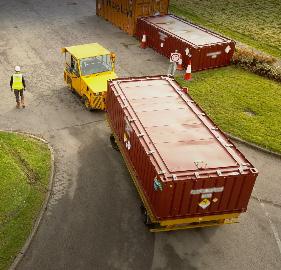

There are significant financial, schedule and risk-reduction benefits for customers from treating Problematic and Borderline ILW and de-classifying them for disposal as LLW. This approach is accepted by the Nuclear Decommissioning Authority and regulators.
At our Winfrith centre of excellence, we have pioneered many innovative technical and management approaches for processing Problematics and Borderline ILW into a compliant form for LLWR disposal. We have extensive experience of developing solutions for wastes such as higher active oily sludge, ion-exchange resins, sands, gravels and desiccants.
Our expertise and site capacity allows us to develop encapsulation solutions including theoretical and inactive trials. Our Nuclear Site License and safety case gives us the flexibility to develop active trials leading to a treatment and disposal solution.


Characterisation and analysis provides reliable, independent data for waste management decision making. Our experienced team will work with you to make sense of the data, so that you can make informed decisions about the right treatment and disposal options.
Our UKAS Accredited Testing Laboratory allows us to offer a wide range of analytical tools and techniques for radioactive waste at activity levels up to and including ILW, including high dose rate and Alpha material. Our Fawley site also provides radionuclide, chemical and physical analysis and at our Aberdeen site we carry out analysis on Naturally Occurring Radioactive Materials for oil and gas customers.
Our dedicated, qualified and experienced team provides analysis advice and sampling plans designed to ensure you understand the wastes you are dealing with and how best to store, budget, consign, transport, treat and dispose of your radioactive materials.
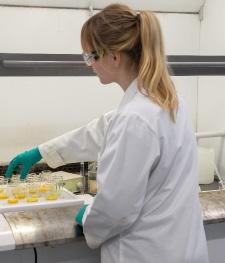

As more complex contaminated metals emerge from decommissioning projects, you need a more flexible service for higher active, Co60 activated and complex metal types.
We provide bespoke, safe, BAT/BPM compliant and economic solutions for accepting, processing, decontaminating and recycling radioactively contaminated metallic wastes for both out of scope recycling and for re-use in the nuclear industry. This enables us to optimise the diversion of disposal volume from the LLWR site in line with the national waste strategy. We provide our customers with access to the widest ranging site safety case and Waste Acceptance Criteria for metals processing in the Nuclear industry, allowing the processing of metals from VLLW to ILW Borderline levels of contamination.
Our facilities have the capability and capacity to handle anything from small components through to extremely large units weighing more than 50 tonnes each.
Importantly we have the permitted capacity to accept and store metallic waste allowing us to provide a cradle to grave cost effective and compliant solution which meets the criteria associated with the UK radioactive waste disposal hierarchy. As a nuclear facility we carry all necessary insurance to cover all aspects of nuclear liability for your metallic waste project.
We also complete the entire suite of NWS documentation on your behalf for all post processing wastes and we are experienced in the arrangement of Trans Frontier Shipment arrangements.
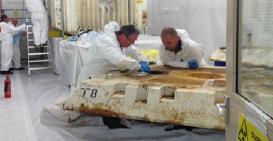
Copper
Aluminium
Lead
Steel (including Stainless & Galvanised)
Two-component metals e.g. lead-filled steel flasks
Active metals e.g. sodium

We own and operate the only commercial radioactive waste supercompaction facility in the UK.
Supercompaction is a treatment approach that can provide options for dealing with Borderline ILW Wastes by de-classifying mixed loads for disposal as LLW. It is increasingly being used as an integrated treatment solution in more complex waste projects. Examples include supercompacted pucks being used as co-packaging material, with disposal volumes further maximised by pouring active grout into voidages, or pucks being loaded to fill part-dismantled ILW pond skips.
The process can significantly reduce disposal costs, for example by maximising the number of drums that can be deposited in a single disposal container prior to consignment to the LLWR site.
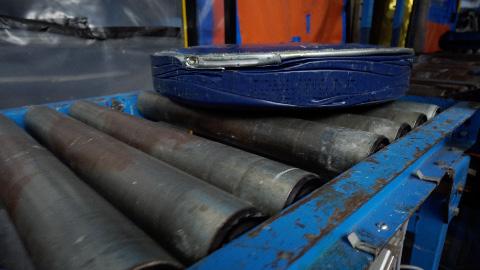

Our Winfrith site is unique in terms of its technology, facilities and its radioactive discharge authorisations for tritium decontamination, treatment and disposal.
We have developed solutions and dedicated facilities for treating and disposing of most tritium and tritiated wastes such as washing, thermal detritiation, recycling and incineration. This allows us to accept ILW levels of tritium activity for cradle to grave processing.
Working together, our Inutec and Fawley teams have successfully treated large volumes of desiccant waste from nuclear sites. We have treated and disposed ILW desiccant as VLLW having removed a high proportion of the tritium as an aqueous waste and subsequently incinerating it at Fawley. In addition, we have treated Tritium Storage Beds, Tritiated Targets, Molecular Sieves and various types of tritiated metals and soft wastes.
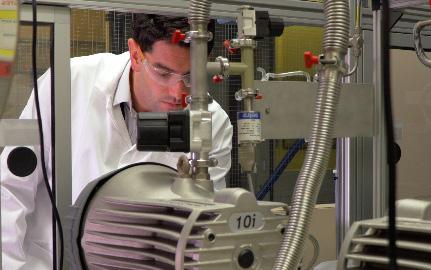
We also have in-house capabilities for tritium measurement by liquid scintillation counting of liquid samples, on-line ionisation chamber measurement of gas and airborne tritium, analysis by combustion, radiographical measurement of tritium distribution over surfaces, mass spectrometry, and dedicated in-plant equipment associated with tritium recycling.

We are a world leader in the field of radioactive waste cementation, from cement formulation through to performance evaluation and commercial operation. Our expertise and facilities provide unparalleled flexibility to customers in treating a wide variety of complex LLW and Borderline ILW wastes.
We can encapsulate by mixing in batches and either directly pour into a disposal container to eliminate void space and maximise container volume utilisation, or transfer the mixed product into suitable-sized interim packages, which are in turn placed inside a disposal container. As well as a static plant located in Winfrith, we have also operated a mobile plant transportable on customer sites.
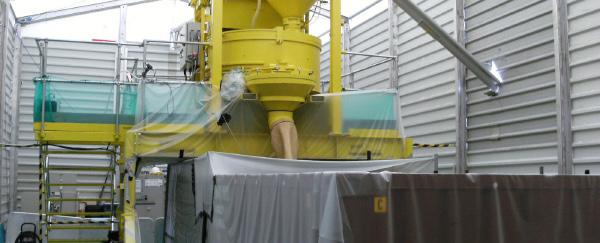
Our development facilities; inactive and active, include:
Cement formulation labs
Large scale cement transfer equipment and mixers
A large rig bay for process scale up (including 10 tonne Crane)
Inactive and active development labs for LLW & ILW
Chemical and radiochemical analysis labs
Microstructural analysis

Our high temperature incinerator at Fawley has extensive permits that enable acceptance of a wide scope of radioactive waste and package types generated by the nuclear industry. This includes all types of metallic drums, palletised wastes such as HEPA filters, re-usable wheelie bins, soft sided packages and IBCs.
High temperature incineration provides the highest level of secure and reliable disposal for hazardous organic wastes. Operating at temperatures in the excess of 1100ºC, we can completely guarantee the destruction of hazardous and radioactive wastes resulting in VLLW residues with typical volume reductions of up to 80%.
Working together with the Winfrith site has enabled Tradebe to provide a complete initial treatment and incineration process. We continue to innovate, with higher activity wastes being disposed of as LA-LLW, which provides a more flexible and cost-effective solution for customers.


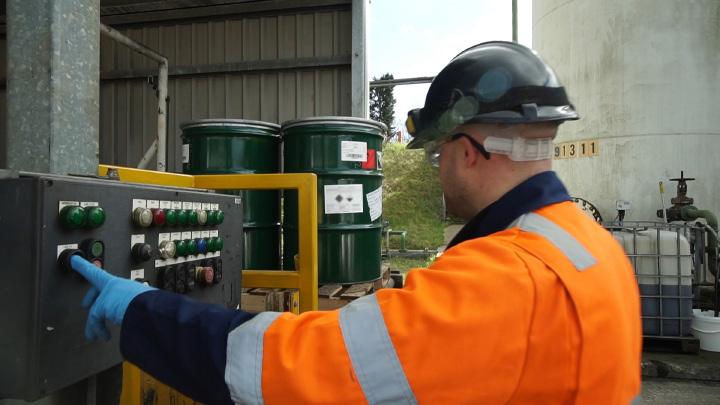

EDF desiccant treatment from AGR power stations
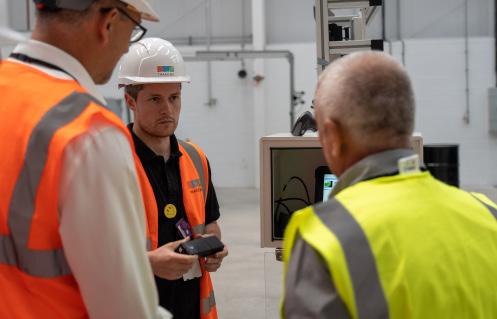
Working collaboratively with EDF since 2009, Tradebe Inutec developed a method for the treatment and disposal to the LLWR of spent ILW desiccant utilising a washing and encapsulation process.
The process of producing electricity at EDF power stations involves the use of desiccants which become tritium activated. This will result in future arisings being diverted away from the LLWR in line with the UK waste hierarchy.
On-site radioactive waste storage space is limited, so EDF needed to develop a cost-effective and sustainable process and supply chain that would facilitate regulated treatment of the activated desiccant, rendering it suitable for off-site disposal at a suitable repository or other innovative final treatment.
Working collaboratively, EDF and Tradebe Inutec developed a desiccant washing and encapsulation process, producing a waste package which is transportable under UK regulations and meets the waste acceptance criteria of the LLWR. Following successful trials, a processing plant was installed at Tradebe Inutec’s Winfrith facility which is still in operation.
The EDF and Tradebe team have worked closely to innovate the process towards incineration at Fawley, a solution that meets the changing UK regulatory framework, best practice and sustainability objectives. This will result in future arisings being diverted away from the LLWR in line with the UK waste hierarchy.
Since installation of the treatment plant at our Winfrith facility, Tradebe Inutec has successfully washed and disposed of more than 300m3 of encapsulated desiccant to the LLWR. Following this successful collaboration, EDF is now utilising a direct incineration route for desiccant, that has recently seen desiccant from Dungeness B incinerated at the Fawley site.
This has resulted in three key wins for EDF, freeing up significant storage space, the realisation of internally focused KPI’s and meeting the aspirations of the UK regulator in safely and compliantly disposing of radioactive waste.

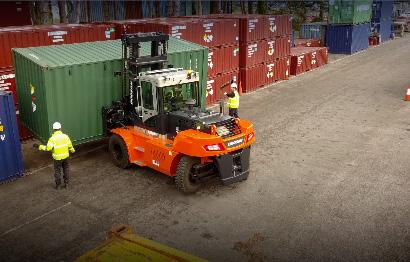
Innovative FED solution.
Collaborative working for Bradwell First Of A Kind, innovative and unique solution to facilitate fast and effective
Problematic radioactive waste treatment.
At Magnox’s Bradwell site, FED waste had been recovered into drums from storage vaults and included uncorroded metallic magnesium alloy; corrosion products; gravel from the storage vaults and interface waste.
The baseline strategy to treat over 240 tonnes of FED at Bradwell by dissolving it in nitric acid had suffered delays due to significant technical challenges. A new approach to managing FED was needed to mitigate decommissioning delays and costs.
An integrated project team of Tradebe Inutec, Magnox and the LLWR was established to develop a new management route for this radioactive waste, enabling disposal at the LLWR, and diverting suitable FED from dissolution to mitigate delay risk to Bradwell entering ‘Care & Maintenance’.
The project diverted 145 tonnes of LLW FED, gravel and interface materials to the new route, within the agreed timescale.
The project enabled a huge step forward in the decommissioning of one of the UK’s earliest nuclear sites, with approximately 1,400 FED drums transferring off Magnox’s Bradwell site. This led to approximately two years of dissolution operations being saved, bringing forward the site closure programme by nearly a year and representing £29M in taxpayer savings.
New solutions and techniques to deal with problematic radioactive waste more quickly and efficiently were identified, supporting the NDA’s mission.


Tradebe Inutec helped Magnox’s Oldbury power station to reduce project schedule and save disposal costs through an innovative sludge encapsulation project.
A large tank at Oldbury containing historic AETP sludge needed to be removed, treated and disposed of so that operations could continue. The two main challenges were first to mix the sludge in the tank so that it could be reliably sampled and analysed to confirm its suitability for disposal as LLW and also to develop a robust treatment formulation and secondly to encapsulate the mixed sludge retrieved from the tank to minimise the volume of waste for disposal.
Tradebe Inutec’s innovative solution included working closely with the Oldbury project team to use a new mobile plant to deal with the sludge at Oldbury as well as using pioneering air-driven technology to homogenise the waste in the tank without adding to the volume of the waste.
Once removed, Tradebe Inutec developed a bespoke process to encapsulate the sludge into a cement treatment formulation that met LLWR requirements for disposal and used its proprietary direct-pour technique to make full use of the capacity of the ISO container.
Tradebe Inutec’s team worked handin-hand with Oldbury’s project team, providing a safe and flexible solution. Our unique approach meant that Oldbury needed to dispose of fewer ISO containers of waste to the LLWR. When combined with a 7-week reduction in processing time that helped shorten the overall project duration by four months, there was a saving of £800,000 for the UK taxpayer.

decontamination & recycling of complex metallic items

Complete offsite treatment by Tradebe Inutec enabled Babcock to demonstrate best practice to its regulator.
Babcock’s 12 redundant flasks needed to be treated to meet regulatory requirements. However, an on-site treatment solution was not an option due to potential interference with other operations: treatment offsite effectively de-risked the dockyard’s decommissioning programme.
There were concerns that transporting such large legacy waste items would be a barrier to offsite treatment as well as uncertainty about contamination issues that might emerge during the treatment and recycling process. A specialist partner was needed to provide the project expertise and reassurance to Babcock and its stakeholders.
Careful planning, teamwork and close liaison with regulators enabled the flasks to be qualified for movement as IP2 packages. A specialist loading frame was constructed for transport. Project-specific safety procedures were generated for loading and unloading, resin removal, transfer, storage and return.
Once at Winfrith, the experienced Tradebe Inutec team completely dismantled the flasks and the carbon steel body and lid were decontaminated. The inner tank and flask body components were melted and recycled at our partner facilities in the UK and Germany.
The 100% treatment and recycling solution provided by Tradebe Inutec was important to Babcock in demonstrating best practice to its regulator.
The flexible approach taken by Tradebe Inutec in overcoming problems gave Babcock considerable peace of mind that this complex inventory would be professionally and completely handled without any waste being returned.
The offsite treatment solution chosen by Babcock enabled the project to be completed more effectively and without interfering with Devonport operations.

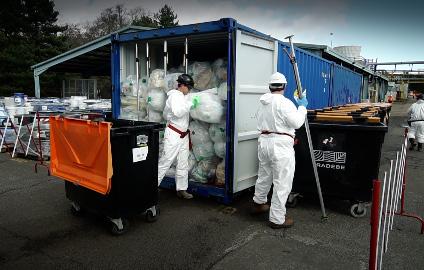
Incinerator enable major UK nuclear site to achieve 97% diversion of its largest waste stream.
A major UK nuclear site’s new infrastructure programme is significantly reducing its capacity to process one of its waste streams - currently the UK’s largest waste stream going into the LLWR’s vault. The UK waste strategy for diversion, the waste hierarchy and LLWR’s vault life extension meant it was important to optimise the diversion of this waste stream.
For this demonstration project, Tradebe Inutec developed a new process using novel technology to more effectively sort and segregate 52 HHISOs of this waste and measure its radioactive contents, allowing a significantly larger proportion of waste to be incinerated at the Tradebe Fawley site. Over the duration of the project, Tradebe Inutec coordinated over 50 individual radioactive transport consignments and processed approximately 900m3 of this waste.
The net result was an increase in the diversion of this waste stream into the LLWR from 35% to 97%. Subsequent supercompaction of the remaining 3% disposal volume by Tradebe Inutec further reduced the volume sent for disposal, optimising the disposal process.
Diversion of this ‘bagged waste’ to Winfrith for processing has significantly reduced the amount of waste being sent to the LLWR vault and supported regulatory requirements. Working together, Tradebe’s Winfrith and Fawley incinerator sites delivered the project in 9 months rather than the 12 months originally planned, for a fixed price and at a reduced programme cost for this major UK nuclear site.

Desiccant analysis for major UK decommissioning station
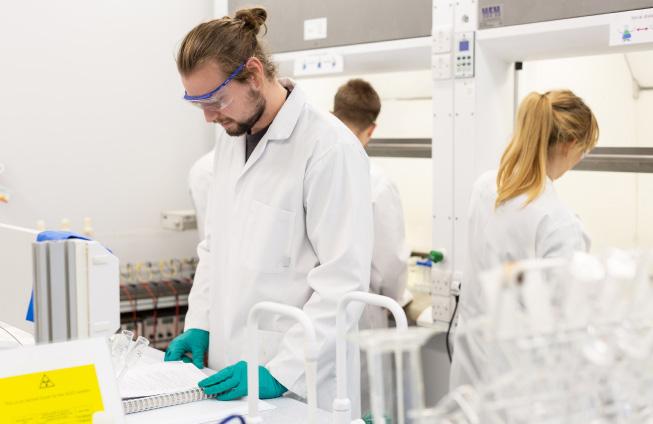
Insights from Tradebe Inutec’s analytical work inform customer on most effective waste treatment approach.
customer challenge
The customer had a large inventory of drums containing spent desiccant. These drums were potentially contaminated with tritium to ILW levels, and had been mixed with used desiccant drums. In addition the tritium in the older drums containing used desiccant could have decayed to LLW levels.
Tradebe Inutec solution
Tradebe Inutec’s considerable experience in the design and operation of a variety of types of sampling equipment, working and taking samples at customers’ sites, technical experts and its facility to handle the samples enabled Tradebe Inutec to take samples from drums and characterise the drums as freerelease, LLW or ILW.
The customer valued the quality of the work, the report content and Tradebe Inutec’s ability to offer alternative solutions to their problem. The report’s conclusions enabled the customer to understand the desiccant waste stream and for them to decide as to the next stage of disposal.

Innovative treatment of complex ILW desiccant
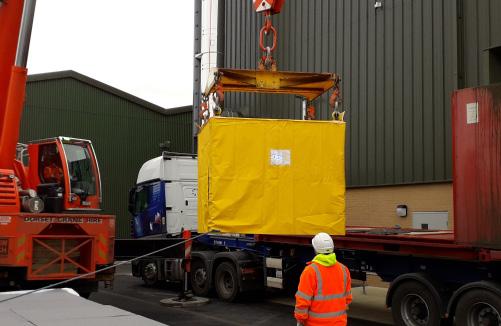
Tradebe Inutec and Fawley
Incinerator enable shipment and innovative treatment of a complex ILW waste from decommissioned nuclear site.
A major UK nuclear operator needed to release valuable space in an interim storage facility at a recently closed nuclear licensed site and at the same time remove waste from a strategic asset to allow its reuse. The ILW desiccant waste required an innovative approach to transport, retrieval and treatment.
A multi-faceted technical and service approach was needed along with close tripartite working between Tradebe Inutec, the waste producer and final repository to design, trial and rollout a safe, first of a kind approach. Tradebe Inutec created a bespoke solution for receipt, handling and retrieval of the desiccant from the DCIC containers and utilised its ILW analytical labs to provide data to inform decisions on the most appropriate sentencing route.
Working together with our Fawley incinerator, trials were undertaken to identify the most cost-effective and practical treatment route for this higher activity waste.
Tradebe Inutec’s breath of facilities, extensive permit conditions and integrated working with Fawley enabled it to characterise and trial waste treatment and disposal options that could not have been undertaken on the waste producer’s site. When complete, the project should demonstrate timely removal of an ILW waste liability and deliver significant cost benefits for the taxpayer by avoiding the need for costly storage at site and then, long term, in the GDF.
When complete, the project should demonstrate timely removal of an ILW waste liability and deliver significant cost benefits for the taxpayer by avoiding the need for costly storage at site and then, long term, in the GDF.


David Ferguson - 07968 707 069 david.ferguson@tradebe.com
Tim Dowling - 07760 101 616 tim.dowling@tradebe.com
Oak Road, Dorset Innovation Park, Winfrith Newburgh, Dorset, DT2 8WQ
